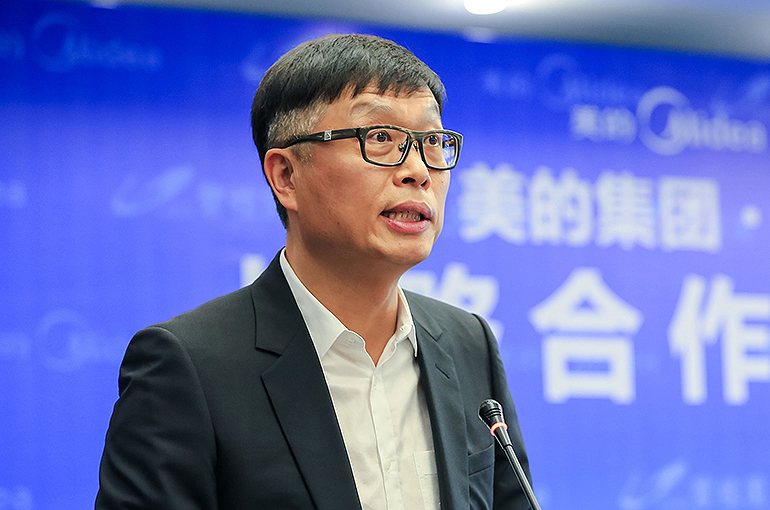 Midea to Focus More on Robots, New Energy as Home Appliance Sales Stall, Chair Says
Midea to Focus More on Robots, New Energy as Home Appliance Sales Stall, Chair Says(Yicai Global) May 22 -- Midea Group will put more emphasis on emerging sectors, such as robots, electric systems and new energies, to make this the group’s second-biggest engine for growth as the household appliance industry reaches a plateau, the chairman of the Chinese white goods maker said.
Last year, Midea raked in almost CNY90 billion (USD13 billion) in business-to-business transactions from these three emerging sectors, a jump of 20 percent from the year before, Fang Hongbo, who is also president of the Foshan, southern Guangdong province-based group, said on May 19.
The household appliance sector, which accounts for 70 percent of the company’s revenue, has entered a period of maturity and Midea needs to diversify its product portfolio from that of white goods, which are labor intensive, Fang said during the 2022 general meeting of shareholders.
Midea completed the takeover of German industrial robot maker Kuka in November last year and the firm is now investing heavily in expanding its footprint in China, Fang said. Revenue from Kuka’s China business was only around 7 percent of the industrial robot maker’s total revenue, when Midea made its first investment in Kuka several years ago, he said. This rose to 23 percent last year and will likely advance to between 25 percent and 28 percent this year, he said.
Low-cost robots have huge application potential, Fang said. The size of the Chinese market together with the synergy in supply chains give Kuka a unique advantage.
As a newcomer in the new energy vehicle parts and energy storage sectors, Midea is pursuing a strategy of both ‘working independently’ and ‘growth by assets acquisition.’ It will tackle competition through acquisitions and by taking the companies private later on. For example, the firm has bought majority stakes in industry players such as Hiconics Eco-energy Technology and Shenzhen Clou Electronics, both of which trade on the Shenzhen stock market.
Going Global
The next step for Midea’s home appliance business is to “upgrade and go global,” said Vice President Wang Jianguo, who is also a director of the firm and president of its smart home business group.
Achieving sales growth in household appliances has become rather difficult, so it is essential that the company upgrades its products to allow for higher pricing, Wang said. It is developing more high-end devices to maintain profitability.
“For the latest home appliances, Midea will focus on mainstream products such as coffee machines and air fryers, but will avoid fast-moving consumer goods as they are not part of our genetic makeup,” Wang added.
Going global is another important part of Midea’s strategy. Overseas revenue accounts for more than 40 percent of the firm’s earnings, Wang said. Although orders started to tumble from the fourth quarter last year, they began to bounce back in March. International orders are expected to jump by between 15 percent and 18 percent this year from the year before, boosting overseas revenue.
With the exception of the Southeast Asian and US markets, Midea’s export business returned to growth from the start of the second quarter, he said. The company is now taking advantage of the weak Chinese yuan and low raw material prices to secure more orders.
Editors: Tang Shihua, Kim Taylor